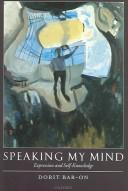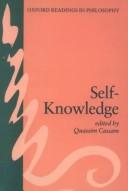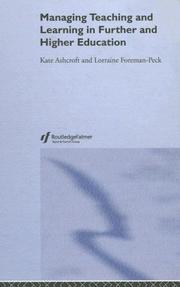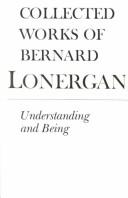| Listing 1 - 10 of 39 | << page >> |
Sort by
|

ISBN: 9780674011564 9780674030442 0674011562 Year: 2003 Publisher: Cambridge, Mass. Harvard University Press
Abstract | Keywords | Export | Availability | Bookmark
 Loading...
Loading...Choose an application
- Reference Manager
- EndNote
- RefWorks (Direct export to RefWorks)
Philosophical anthropology --- Self-knowledge, Theory of --- Self-presentation
Book
ISBN: 0803981201 9780803981201 Year: 1988 Publisher: London: Sage publications,
Abstract | Keywords | Export | Availability | Bookmark
 Loading...
Loading...Choose an application
- Reference Manager
- EndNote
- RefWorks (Direct export to RefWorks)
Sociological theories --- Self-knowledge, Theory of --- Connaissance de soi --- #SBIB:316.23H1 --- #SBIB:022.TOND --- Kennissociologie
Multi
ISBN: 9781108874304 9781108836647 9781108812757 1108874304 1108877613 Year: 2020 Publisher: Cambridge : Cambridge University Press,
Abstract | Keywords | Export | Availability | Bookmark
 Loading...
Loading...Choose an application
- Reference Manager
- EndNote
- RefWorks (Direct export to RefWorks)
The notion of an empirical person raises a puzzle for Kant’s transcendental philosophy. On the one hand, an empirical person is conceived of as exercising mental capacities, such as reasoning, willing, and feeling, and hence as capable of representing the world and of initiating actions. As such, it cannot be intuited in accordance with (at least) some conditions of empirical cognition; for instance, it cannot be intuited as a persistent mental substance. On the other hand, an empirical person is understood as being embedded in the spatiotemporal and causally structured empirical world. This raises the questions of what kind of “entity” an empirical person is and how we can know ourselves as such. Can an empirical person be cognized as an object of experience at all, or does it have an entirely different status? In this talk, I offer a novel reading of Kant’s account of psychological personhood – an account that is able to resolve this puzzle by appealing to Kant’s conception of reason and in particular to the rational idea of the soul. My argument comes in two parts. First, I show that we can have empirical cognition of ourselves as empirical persons, i.e., inner experience. Such experience should, however, not be understood as the cognition of a mere object, e.g., a spatio-physical object. Nonetheless, inner experience proceeds by analogy with the cognition of such objects. This analogy, I argue, rests on the regulative use of the idea of the soul. Secondly, I defend what I call the self-formation view of personhood. On this view, a person is understood as a mental whole that first forms herself in the course of realizing her mental capacities under the guidance of a unifying idea, the idea of the soul. Hence, I argue that this idea is also practically efficient in the self-formation of persons in that the idea normatively prescribes what it takes to be an integrated mental whole. I conclude by drawing some consequence regarding the co-dependence of empirical self-knowledge and self-formation.
Philosophical anthropology --- Kant, Immanuel --- Self-knowledge, Theory of --- Self (Philosophy) --- Kant, Immanuel, --- Criticism and interpretation.

ISBN: 9780801474170 0801474175 Year: 2007 Publisher: New York Cornell university press
Abstract | Keywords | Export | Availability | Bookmark
 Loading...
Loading...Choose an application
- Reference Manager
- EndNote
- RefWorks (Direct export to RefWorks)
An amnesia victim who asks "Who am I?" means something different from a confused adolescent asking the same question. Marya Schechtman takes issue with analytic philosophy's emphasis on the first sort of question to the exclusion of the second. The problem of personal identity, she suggests, is usually understood to be a question about historical life. What she calls the "reidentification question" is taken to be the real metaphysical question of personal identity, whereas questions about beliefs or values and the actions they prompt - the "characterization question"--Are often presented as merely metaphorical. Failure to recognize the philosophical importance of both, Schechtman argues, has undermined analytic philosophy's attempts to offer a satisfying account of personal identity. Considerations related to the characterization question creep unrecognized into discussions of reidentification, with the result that neither question is adequately addressed. Schechtman shows how separating the two allows for a more fruitful approach to the reidentification question, and she develops her own narrative account of characterization.
Philosophical anthropology --- Identity (Philosophical concept) --- Self. --- Self-knowledge, Theory of. --- Individuality. --- Zelfkennis. --- Individualiteit. --- Identiteit. --- Identity (Philosophical concept).

ISBN: 0199276285 0199263205 0191602892 1281198439 0191532428 9786611198435 1435622219 9780199276288 9781435622210 9780199263202 9780191532429 Year: 2004 Publisher: Oxford New York Clarendon Press Oxford University Press
Abstract | Keywords | Export | Availability | Bookmark
 Loading...
Loading...Choose an application
- Reference Manager
- EndNote
- RefWorks (Direct export to RefWorks)
Dorit Bar-On develops and defends an original view of avowals and self-knowledge which offers systematic answers to many persistent questions concerning our ability to know our own minds. According to Bar-On's Neo-Expressivist view, avowals - those everyday spontaneous pronouncements that we make about our own present states of mind - are acts through which we directly express, rather than merely report, the very mental conditions the avowals ascribe. Verbal acts of speaking ourminds are thus similar to natural expressions, such as sighing, or smiling; they show, rather than simply telling of
Connaissance de soi [Theorie de la ] --- Introspection (Theory of knowledge) --- Knowledge [Reflexive ] --- Knowledge of self [Theory of ] --- Reflexive knowledge --- Self-knowledge [Theory of ] --- Zelfkennis [Theorie van de ] --- Philosophical anthropology --- Theory of knowledge --- Philosophy of language --- Self-knowledge, Theory of --- Knowledge, Reflexive --- Knowledge of self, Theory of --- Reflection (Theory of knowledge) --- Knowledge, Theory of --- Personality (Theory of knowledge) --- Self (Philosophy) --- Self-knowledge, Theory of.

ISBN: 0198751168 019875115X Year: 1994 Publisher: Oxford [etc.] : Oxford University Press,
Abstract | Keywords | Export | Availability | Bookmark
 Loading...
Loading...Choose an application
- Reference Manager
- EndNote
- RefWorks (Direct export to RefWorks)
This volume brings together some of the most important and influential recent writings on knowledge of oneself and of one's own thoughts, sensations, and experiences. The essays give valuable insights into such fundamental philosophical issues as personal identity, the nature of consciousness, the relation between mind and body, and knowledge of other minds. [publisher's description]
Connaissance de soi [Theorie de la ] --- Knowledge [Reflexive ] --- Knowledge of self [Theory of ] --- Self-knowledge [Theory of ] --- Zelfkennis [Theorie van de ] --- Self-knowledge, Theory of. --- #GROL:SEMI-130.171 --- Philosophical anthropology --- Self-knowledge, Theory of --- #GROL:SEMI-101<08> Oxfo --- Introspection (Theory of knowledge) --- Knowledge, Reflexive --- Knowledge of self, Theory of --- Reflection (Theory of knowledge) --- Reflexive knowledge --- Knowledge, Theory of --- Personality (Theory of knowledge) --- Self (Philosophy)

ISBN: 0750703377 0750703369 Year: 1994 Publisher: London Falmer
Abstract | Keywords | Export | Availability | Bookmark
 Loading...
Loading...Choose an application
- Reference Manager
- EndNote
- RefWorks (Direct export to RefWorks)
Higher education --- College teaching. --- Education --- Learning. --- Self-knowledge, Theory of. --- Lerarenopleiding --- Pedagogiek en onderwijskunde --- Philosophy. --- algemeen --- lerarenvervolmaking en research --- algemeen. --- lerarenvervolmaking en research. --- Algemeen. --- Lerarenvervolmaking en research.
Book
ISBN: 9780190226428 9780190226411 9780190226435 9780190630553 Year: 2017 Publisher: New York : Oxford University Press,
Abstract | Keywords | Export | Availability | Bookmark
 Loading...
Loading...Choose an application
- Reference Manager
- EndNote
- RefWorks (Direct export to RefWorks)
The acquisition of self-knowledge is often described as one of the main goals of philosophical inquiry. At the same time, some sort of self-knowledge is often regarded as a necessary condition of our being a human agent or human subject. Thus self-knowledge is taken to constitute both the beginning and the end of humans' search for wisdom, and as such it is intricately bound up with the very idea of philosophy. Not surprisingly therefore, the Delphic injunction 'Know thyself' has fascinated philosophers of different times, backgrounds, and tempers.But how can we make sense of this imperative? What is self-knowledge and how is it achieved? What are the structural features that distinguish self-knowledge from other types of knowledge? What role do external, second- and third-personal, sources of knowledge play in the acquisition of self-knowledge? How can we account for the moral impact ascribed to self-knowledge? Is it just a form of anthropological knowledge that allows agents to act in accordance with their aims? Or, does self-knowledge ultimately ennoble the self of the subjects having it? Finally, is self-knowledge, or its completion, a goal that may be reached at all?The book addresses these questions in fifteen chapters covering approaches of many philosophers from Plato and Aristotle to Edmund Husserl or Elisabeth Anscombe. The short reflections inserted between the chapters show that the search for self-knowledge is an important theme in literature, poetry, painting and self-portraiture from Homer.
Philosophical anthropology --- History of philosophy --- Self-knowledge, Theory of --- History. --- Théorie de la connaissance --- Histoire --- Self (Philosophy) --- Moi (Philosophie) --- Connaissance de soi --- Histoire.
Book
ISBN: 9780415733076 9780415558525 9780203867556 0415558522 9781135268565 9781135268602 9781135268619 Year: 2010 Publisher: London ; New-York : Routledge,
Abstract | Keywords | Export | Availability | Bookmark
 Loading...
Loading...Choose an application
- Reference Manager
- EndNote
- RefWorks (Direct export to RefWorks)

ISBN: 0802039871 0802039898 9780802039897 9780802039873 Year: 2005 Volume: 5 Publisher: Toronto University of Toronto
Abstract | Keywords | Export | Availability | Bookmark
 Loading...
Loading...Choose an application
- Reference Manager
- EndNote
- RefWorks (Direct export to RefWorks)
Metaphysics --- Theory of knowledge --- Knowledge, Theory of. --- Comprehension (Theory of knowledge) --- Self-knowledge, Theory of. --- Ontology. --- Ethics. --- Catholic Church --- Doctrines. --- Doctrines
| Listing 1 - 10 of 39 | << page >> |
Sort by
|

 Search
Search Feedback
Feedback About
About Help
Help News
News